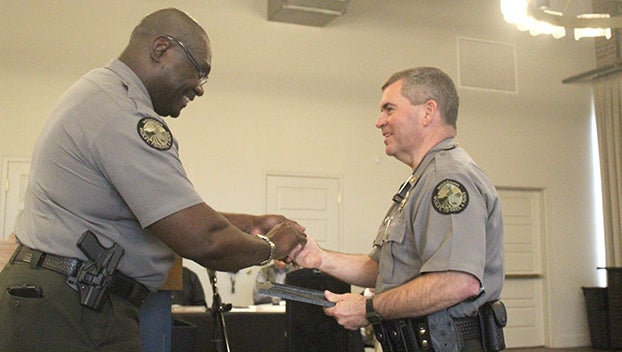Tech and teens: exercise caution
Published 9:08 pm Saturday, November 21, 2015
In this cellphone-saturated age, tensions between the privacy younger users want and the concerns of parents about inappropriate activity are nothing new. Recent events involving a sophisticated sexting ring at a Colorado high school and the creative ways students hid it, however, have many parents at a new level of fear.
Students there are possibly facing felony charges for texting lewd photos. Inappropriate images were allegedly exchanged and stored on phones using an app that is masked as a calculator.
To shed light on the prevalence of cellphone issues in schools, The Daily Leader asked local educators about their experiences and opinions. Brookhaven High School Principal David Martin said sexting or other issues concerning inappropriate activity and the Internet have never come up at BHS. And likely few times, if any, at other local schools, Martin said, as he’s never heard of any incidents within the tight-knit community of local educators.
“Do I think it probably takes place? It wouldn’t surprise me. But I can’t say we’ve dealt with that here,” he said.
BHS counselor Tracy Risher said she can’t think of a single incident involving sexting. Risher said while the lack of incidents is partly because kids are probably just being private about it, she has reason to believe it also isn’t as prevalent here.
Former longtime Alexander Junior High School Principal and current Brookhaven School District Deputy Superintendent Roderick Henderson also said he’s never heard of a sexting incident in his tenure. Henderson said even though most of the potentially concerning activity doesn’t take place at school, if there were major issues, administration would find out. Henderson said even the more relevant issue — cyberbullying — tends to get resolved before anything escalates and carries into school.
“Our students are good about that if they see something on Facebook, Instagram, Twitter, they’ll report what’s going on,” Henderson said. “Students want to be in the environment where they don’t have to deal with a lot of issues, so it nips a lot of things before they happen.”
Martin and Risher agree the most reported incidents between students are in the vein of gossip and bullying.
“The issues are generally the drama: He said she said, but mainly within the same gender, girls talking about girls,” Risher said. “We’ll get students talking about one another, but that’s about all we see with the cellphone issue.”
Sexting and inappropriate content on cellphones have parents nationwide worried about their children’s activities.
“If you’re not monitoring there are ways and pathways for them to get into stuff they don’t need to,” Martin said. “Parents definitely have to be cautious.”
Along with a private photo vault or messaging apps that could get younger users in dangerous situations, there are just as many cellphone or computer-assisted applications for parental surveillance. There are preventative measures offered by the cellphone maker or carrier capable of blocking certain apps or websites, requiring permission for downloading apps and setting parental content controls. Further, there are programs and apps designed to secretly deliver to parents in-depth reports transcribing every text message, website visit and social media interaction by their child.
Caroline Knorr, parenting editor at Common Sense Media, said she worries that child monitoring apps “may prey on parents’ fears. Most kids use media safely.”
There are many who opine that monitoring, even if not overzealously, creates an environment that corrodes trust and could drive kids to be more secretive.
“I don’t think it’s a good thing for the younger kids, 11- and 12-year-olds being on social media isn’t ideal,” Risher said. “But there’s no way to stop it. They’re going to be around it. I think it’s so much more important to teach your children what’s right and what’s wrong instead of monitoring them.”
Knorr also considers cyber-bullying to be a much more common and dangerous problem — and thinks social media monitoring technology is unlikely to catch that.
“Kids know technology better than their parents do. If you rely on technology to monitor your kids or prevent them from engaging in online risks you are getting a false sense of security,” she said. “Any determined kid can defeat any technology you put out there. Even if the company says they can’t, they can.”
Rather than secretively or openly snooping through their children’s phone activity, destroying any sense of privacy and potentially finding what parents don’t want to find, child experts suggest creating an environment of trust, expectation and honesty that may discourage the actions before they occur.
“If you have to spy on your kids, something’s wrong,” said Michael Brody, a child psychiatrist and head of the media committee for the American Academy of Child and Adolescent Psychiatry, in an interview.
“What works to get kids on the right track is the bond between the parent and the child, and that’s much stronger than any punishment or anything else,” he said. “If there is a bond, and the parent expresses disappointment, that’s very important.”
“I think with me, being a parent, I think it’s very important to be open with your children,” Risher said. “I try not to act surprised by anything mine tell me. As a parent if we tried to say ‘It’s not happening to our children,’ then we can’t address it, and they won’t share things. I think as parents we have to acknowledge that certain things are going to happen and keep that communication open so when there is an issue you can address it.”





